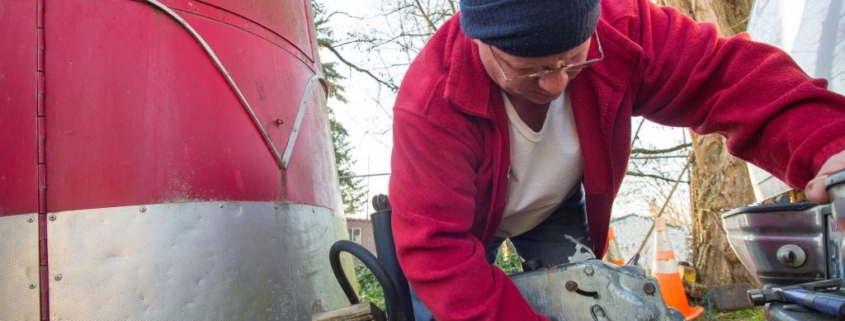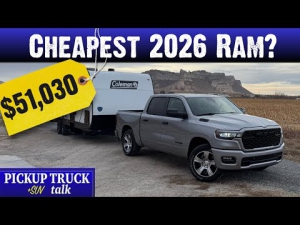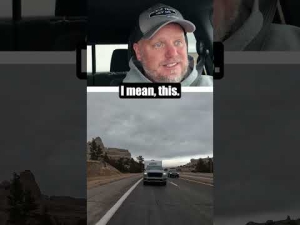Is It Illegal to Have a Ball Hitch if You’re Not Towing Anything?
For a while, the Internet has been circulating this rumor that a legislator walked between two vehicles and bruised their shin on a ball hitch. While it might seem kind of far-fetched for a legislator to have a vendetta against vehicle accessories, some have tried to pass laws requiring removing or covering ball hitches when not towing. So, it begs the question: is it illegal to drive around with an exposed ball hitch anywhere in the United States?
What is a ball hitch and what can be towed using one?
A ball hitch is simply an accessory used with a receiver hitch. It’s comprised of a shank that slides into the receiver tube and a trailer ball platform. The trailer ball platform is designed to make attaching a trailer as easy as possible while providing a solid mounting platform. Ball hitches come in various sizes and capacities, making them one of the most commonly used trailer hitch accessories. Some are made of a single piece, or fixed, while others are comprised of two or more pieces, or adjustable.
Ball hitches are capable of towing between one ton and 15 tons gross trailer weight (GTW). To put that in perspective, the highest-class ball hitch could easily tow a four to five-car hauler trailer or two single-propeller light aircrafts. If a semi-trailer is a little too much for what you’re hauling, the correct class of ball hitch can definitely handle the job.
Nearly all ball hitches feature one or more holes up and down the shank for accepting a hitch pin or hitch lock. Either device prevents the shank from sliding out of the receiver, safeguarding it from theft. You may also use a universal coupler lock along with the coupler latch to keep the coupler securely latched onto your ball hitch.
Sizes, classes, and weight ratings: how to choose?
There are primarily seven different types of trailer hitches and four standard trailer ball sizes: 1-7/8 inches, 2 inches, 2-5/16 inches, and 3 inches. It’s important to note that those measurements refer to the diameter of the ball. These four sizes are the industry standard for ball hitches made and sold in the United States. By standardizing ball hitch sizes, the trailer industry as a whole wanted to be sure consumers were able to couple and tow easily.
According to CURT Manufacturing, “When choosing a trailer ball, first select the ball diameter by matching it to the coupler size. Most manufacturers stamp or label the correct trailer ball size on the coupler. Make sure that your coupler and trailer ball have a solid connection before towing and that all necessary adjustments have been made.
A vehicle’s trailer hitch setup and the type of trailer are determinate factors when one chooses a trailer hitch. Besides types, you have five hitch classes with individual weight ratings. Generally, you would want to pay particular attention to the GTW capacity. The second rating of importance is the maximum tongue weight (TW) or the total weight at the coupling point.
Your TW should ideally be between 10% to 15% of your trailer’s GTW. TW capacities range from as little as 200 pounds maximum for Class 1 to as much as 2,700 pounds maximum for Class 5 commercial duty.
Is it illegal to have a hitch if you’re not towing anything?
In a Q&A section of the Duluth News Tribune, the public information officer with the Minnesota State Patrol, Sergeant Neil Dickenson was posed this question by a reader: “I was wondering if it is illegal to have the ball hitch in the receiver of my truck if I am not pulling any trailers at that time? Also, is it illegal to have more than one ball on my bumper?”
According to Sgt. Dickenson, “No, it is not illegal to have a ball hitch in the receiver of a truck when not pulling a trailer at that time. It is not illegal to have more than one ball hitch on the bumper. But with that being said, you need to be aware that multiple ball hitches on the bumper could obstruct the rear license plate.”
Minnesota law states that it’s “unlawful to cover any assigned letters and numbers or the name of the state of origin of a license plate with any material whatever…” That said, this holds true for most states in the U.S., though you’d be wise to double-check the laws wherever you reside.
RELATED: Can a Compact Car Tow a Trailer?
The post Is It Illegal to Have a Ball Hitch if You’re Not Towing Anything? appeared first on MotorBiscuit.







